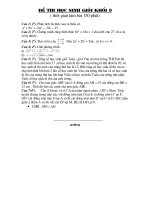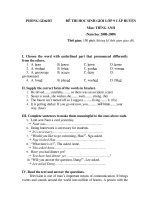ĐÊ thi học sinh giỏi TA 9
Bạn đang xem bản rút gọn của tài liệu. Xem và tải ngay bản đầy đủ của tài liệu tại đây (48.17 KB, 4 trang )
Name:___________________
Class: ________ §Ò Thi Häc Sinh Giái
Question 1: Supply the correct form of the verbs in parentheses:
1) I lit the fire at 6:00 and it (burn)______________ brightly when Tom came in at 7:00.
2) I’m sorry. I (forget)_________________ already her name which you (give) me some days before.
3) Since he (buy)______________ a new car, he (drive)________________to work every day.
4) That building (say)______________ (build)__________________ in three years.
5) It’s no good (write)___________ to him, he never answers letters. The only thing (do)___________ is
(go)__________________ and (see)____________________ him.
6) Listen! I (hear)_______________________ somebody knocking at the front door.
7) If you (smoke)_____________ less, you (have)__________ much more money. But I don’t think you
ever will.
8) Avoid (use)______________ the infinitive after expression. “ It’s no use”
Question 2: Choose the best answer:
1) Many people become ...............because of the natural disasters every year.
A. homeland B. homesick C. homeless D. homework
2) She was really ........by the beauty of the city.
A. impress B. impressed C. impression D. impressive
3) He is a famous ..........
A. poetry B. poem C. poet D. poetic
4) The Malaysian unit of currency is the...............
A. ringgit B. baht C. rial D. yen
5) The national language in Malaysia is ................
A. Chinese B. English C. Malay D. Tamil
6) It was an .............day.
A. enjoy B. enjoyment C. enjoyable D. enjoyably
7) They walked................half an hour to reach the waterfall.
A. to B. at C. in D. for
8) Jeans ............all over the world.
A. sell B. sold C. is sold D. are sold
9) We feel very .........today.
A. happy B. happiness C. happily D. happen
10) I’ve looked ..............my new pen everywhere and I can’t find it anywhere.
A. at B. for C. up D. on
11) My parents saw me........at the railway station.
A. in B. for C. up D. off
12) All the classes were ..............painted.
A. bad B. badly C. worse D. good
13) He is the man ...........helped me yesterday.
A. which B. who C. whom D. whose
14) Where are the photos which ............at the Christmas party?
A. took B. take C. are taken D. were taken
15) I’m very ............that I will go to Dalat tomorrow.
A. excite B. excited C. excitedly D. exciting
Question 3: Reading comprehension:
a) Fill each of the numbered blanks in the following passage. Use only one word in each space:
Most American television programmes (1)……………….produced in Hollywood. Each year, proposals
(2)..................new television serials are submitted to network executives for (3)……………….Only a few are
accepted often those linked (4).....................a highly successful performer or producer.
The ...(5)………………………..phase is the writing of scripts. These scripts are reviewed....
(6)....................the network and a small...(7)…………………...is selected to be ...(8)...................into pilot
programmes if the programming executives like a pilot programme or it ....(9)…………………………good rating in a
trial telecast, the pilot eventually gets produced as a regularly scheduled...(10)…………………………………...
b) Read the following passage and decide if the statements are true(T) or false (F) :
In an experiment in Canada, ten- year- old children were put in classes of four sizes: 16, 23, 30 and 37
children in each class. Their teachers said that the smaller classes would result in more individual attention
and better marks. However, when the children were tested, those in the smaller classes didn’t get higher
marks than the others, except in mathematics. Moreover, pupils in the larger classes said they like school
as much.
Perhaps the most surprising result was the difference between what the teachers expected and the
actual results obtained. More than 90% of the teachers expected the smaller classes to do well.
1) In an experiment in Cambodia, ten-year-old children were put in four different classes with different
sizes.
2) According to the teachers, teachers will pay more attention to students in smaller classes and students
will get higher marks.
3) The result of the experiment showed that students in smaller classes got higher marks than those in the
larger classes.
4) Children in smaller classes enjoyed school more than those in larger classes.
5) Less than 100% teachers expected students in smaller classes to do well.
Question 4: Do as direction bellow:
a) Correct the mistakes for each sentence:
1) Today is more sunny as yesterday._____________________________________________________
2) What was the happier day of your life?__________________________________________________
3) We have lived here for last year._______________________________________________________
4) I’m please hear you had an enjoyable Christmas vacation.___________________________________
5) I used to lived on a farm when I was a child.______________________________________________
b) Complete each of the following sentences, using the words given:
1) Next Sunday/ we/ go/ Hai Phong/ which/ big/ city/ northeast/ Viet Nam.
_____________________________________________________________________________________
2) Brother/ wish/ that/ can speak/ English/ fluent/ as/ native speaker.
_____________________________________________________________________________________
3) I/ ask/ whether/ he/ study/ university/ America/ then.
_____________________________________________________________________________________
4) If/ it/ not rain/ tomorrow/ I/ go camping/ friends.
_____________________________________________________________________________________
5) Phong/ be/ absent/ school/ since/ he/ break/ leg.
_____________________________________________________________________________________
Question 5: Combine the following pairs of sentences into ones using the words given in the
parentheses :
1) The man seems very lonely. His wife and children are away. (whose)
_______________________________________________________________________________________
2) I recently went back to the town. I was born in that town. (where)
_____________________________________________________________________________________
3) The coffee was very hot. I couldn’t drink it. (too)
_____________________________________________________________________________________
4) The ice is quite thick. We can walk on it. (enough)
_______________________________________________________________________________________
5) The people were very nice. We met them on the train to HCM City. (who)
_______________________________________________________________________________________
6) The road was very icy. They couldn’t drive fast. (so)
_____________________________________________________________________________________
7) I went to school as usual yesterday. I had a terrible cold. (although)
_____________________________________________________________________________________
8) The children ran away. They broke the window.(after)
_______________________________________________________________________________________
9) His brother is now working in Liverpool. Liverpool is a big city of England.(which)
_______________________________________________________________________________________
10) He cannot speak Chinese. I cannot speak Chinese. (neither)
_______________________________________________________________________________________
Question 6:
A. Fill in each gap with a suitable word:
Living in the modern world.
Living in our modern world (1).....................different (2) ...............what living
(3)..............................
Our grandfather (4)..............young. Learning to use machines is very important today. Only a (5) ...........
years ago, most of the work of the world was done by (6)............... Today we use machines for everything,
both for working and (7).........................
Machines (8) ..................affected in some ways the lives of people all the world. They have made
possible mass (9) ...............................of all kinds of manufactured goods. Now more families everywhere
can buy cars, refrigerators, washing machines, television sets, factory made clothing and
(10).................................of other things, which our grandfather didn’t have .
B. Each sentence has a mistake, find and correct.
1. Long is the boy whom I think scored the winning points for the police team.
A B C D
2. Each of the luxury cars in the show room was quickly sold their new owner.
A B C D
3. The police hasn’t decided whether or not to change the young men with possession of illegal drugs
A B C D
4. In the end of the party, Trang found herself doing the dishes alone again, as usual.
A B C D
5. The doctor has repeatedly advised him to stop to smoke if he hopes to stay in good health.
A B C D
Question 7: Complete these sentences based on the clues.
1. If / my grandfather/ still alive/ he/ be/ a/ hundred/ today.
_____________________________________________________________________________________
2. You/ mind/ I/ ask/ you/ a question?
____________________________________________________________________________________
3. It’s / two months/ since/he/ leave/ his village
_____________________________________________________________________________________
4. I/ just have/ wonderful holiday/ cousins/ Dalat.
_____________________________________________________________________________________
5. He /spend/ most time/ read/ pictures stories/ when/ he/ be/ small.
______________________________________________________________________________________
Question 8: Complete sentences.
1. Last Monday / I / went/ an excursion / Cambridge
_____________________________________________________________________________________
2. I / went / my classmates.
_____________________________________________________________________________________
3. I / got up / early / and / met / school.
_____________________________________________________________________________________
4. Morning / we / the city / It / interesting.
____________________________________________________________________________________
5. We / lunch / a restaurant / I / drink/ some beer.
_____________________________________________________________________________________
6. Afternoon / we / walk/ park.
_____________________________________________________________________________________
7. I / meet / English man / blue eyes.
_____________________________________________________________________________________
8. I / not / practise / English / because / spoke / French / time
_____________________________________________________________________________________
9. Do / you / nice / weekend ? I / you / much.
_____________________________________________________________________________________
Question 9: Change these sentences into passive voice.
1. They haven't sent us the book they published last year.
_____________________________________________________________________________________
2. No one has made any comments on the event.
_____________________________________________________________________________________
3. What do they call the new hotel?
_____________________________________________________________________________________
4. They made us stay indoors while they were testing the new weapon.
_____________________________________________________________________________________
5. They expect you to arrive at work 5 minutes earlier than the others.
_____________________________________________________________________________________









